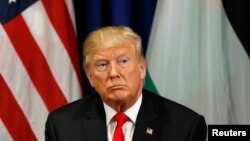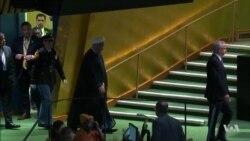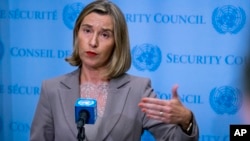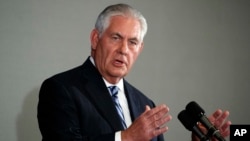U.S. President Donald Trump said Wednesday he has decided whether to pull the United States out of the 2015 international pact curbing Iran’s nuclear weapons development.
“I have decided,” he told reporters while on a photo call in New York with Palestinian Authority President Mahmoud Abbas. “I’ll let you know.”
On Tuesday, Trump disparaged the deal at the U.N. General Assembly, calling it one of the worst transactions the U.S. has ever entered into. It was negotiated during the administration of his predecessor, Barack Obama. Its provisions keep Tehran from developing nuclear weapons in exchange for lifting heavy economic sanctions.
WATCH: President Rouhani: Iran Deal Not Renegotiable
Iranian President Hassan Rouhani told the assembly Wednesday that Tehran is in compliance with its international obligations and would not break them.
“I declare before you that the Islamic Republic of Iran will not be the first country to violate the agreement; but it will respond decisively and resolutely to its violation by any party,” Rouhani said. “It will be a great pity if this agreement were to be destroyed by rogue newcomers to the world politics.”
Rouhani was adamant that the deal cannot be renegotiated, which is one option Trump has suggested.
“This agreement is not something someone can touch,” Rouhani told reporters at a news conference. “This is a building that from the frame of which, if you take off a single brick, the entire building will collapse.”
Inspectors from the U.N. nuclear watchdog agency the IAEA, which monitors the deal’s implementation, have found Iran consistently in technical compliance. But U.S. officials argue that Tehran’s ballistic missile tests and its support for militant groups and Syria’s dictator breach the spirit of the deal.
The administration has twice certified that Iran is complying with the agreement but Trump has said he would not keep doing so indefinitely. Iran is facing a new assessment deadline in mid-October. If the U.S. were to withdraw, the deal could collapse.
Signatories meet
The seven signatories met Wednesday night at the United Nations. The European Union’s Foreign Policy chief, Federica Mogherini, chairs the joint commission that is monitoring the deal’s implementation.
“The agreement is concerning the nuclear program, as such it is delivering, we all agreed that all parties are fulfilling their commitments, the agreement is being implemented,” Mogherini told reporters.
She said there is no need to reopen the multilateral agreement, which was endorsed by the U.N. Security Council in a legally binding resolution.
“As Europeans, we will make sure the agreement stays,” she added.
“I think it would be a mistake just to abandon the nuclear agreement without anything else,” French President Emmanuel Macron told reporters earlier Wednesday. But he did express that while the deal is a good one, it could have additional pillars covering ballistic missile activity, the post-2025 period when some restrictions end, and include discussions with Iran about the current regional situation.
The meeting was the first encounter between U.S. Secretary of State Rex Tillerson and his Iranian counterpart, Mohammad Javid Zarif.
“It was a good opportunity to meet and shake hands,” Tillerson told reporters afterward. “The tone was very matter of fact, there was no yelling; we didn’t throw shoes at one another.”
He said the U.S. has “significant issues” with the agreement, from a political, not a technical standpoint. He added that he did not know that President Trump would say Wednesday that he had made a decision about the agreement.
The secretary said the U.S. had presented its case to its allies and shared its concerns about Iran’s troubling behavior.
White House Correspondent Peter Heinlein in New York contributed to this report.








